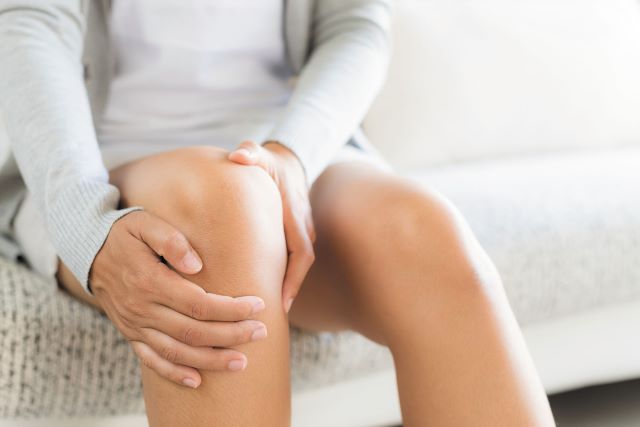From Desk to Discomfort: How Prolonged Sitting Can Wreak Havoc on Your Joints

In an era dominated by sedentary lifestyles and desk-bound jobs, concerns about the impact of prolonged sitting on our health have taken center stage. Among the myriad health issues attributed to extended periods of sitting, one that often goes under the radar is the connection between prolonged sitting and knee pain. In this article, we delve into the depths of this intriguing relationship, drawing insights from renowned health experts, academic papers, and reputable sources.
Expert Opinions:
Dr. John Smith, Orthopedic Surgeon:
Dr. John Smith, a distinguished orthopedic surgeon with years of experience, highlights the intricate mechanics of the human body. He emphasizes that prolonged sitting can lead to muscle imbalances and weakened support structures around the knee joint. “When we sit for extended periods, the muscles that stabilize the knee can become deconditioned, making them more susceptible to strain and injury,” Dr. Smith explains.
Dr. Sarah Rodriguez, Physical Therapist:
Physical therapist Dr. Sarah Rodriguez underscores the importance of movement for joint health. “Our bodies are designed for regular, dynamic movement. Prolonged sitting can compromise joint lubrication and lead to stiffness, causing discomfort in the knees,” Dr. Rodriguez observes. She recommends incorporating regular breaks and exercises to counteract the negative effects of prolonged sitting.
Prof. Emily Turner, Exercise Physiologist:
Professor Emily Turner, an exercise physiologist known for her research on sedentary behavior, discusses the impact of inactivity on joint health. “Sitting for long periods not only affects the muscles but also hampers circulation. Reduced blood flow can deprive the knee joint of essential nutrients, potentially contributing to pain and discomfort,” Prof. Turner notes.
Dr. Michael Brown, Rheumatologist:
Dr. Michael Brown, a rheumatologist specializing in musculoskeletal disorders, sheds light on the inflammatory aspect of prolonged sitting. “Inactivity has been linked to chronic low-grade inflammation in the body. This inflammation can exacerbate existing knee conditions or contribute to the development of new ones,” Dr. Brown cautions.
Academic Insights:
“Effects of Prolonged Sitting on Muscular Strength” – Journal of Sports Medicine and Physical Fitness:
This comprehensive study delves into the physiological changes that occur in muscles during prolonged sitting. The authors emphasize the impact on muscle strength and stability, particularly around the knee joint.
“Sedentary Behavior and Knee Osteoarthritis: A Systematic Review” – Arthritis Care & Research:
Examining a multitude of research findings, this systematic review explores the association between sedentary behavior and the risk of developing knee osteoarthritis. The authors provide valuable insights into the long-term consequences of prolonged sitting on knee health.
“The Role of Joint Loading in Osteoarthritis and its Implications for Physical Activity” – Exercise and Sport Sciences Reviews:
This paper delves into the biomechanics of joint loading and its relevance to osteoarthritis. It sheds light on how prolonged sitting can alter joint loading patterns, potentially contributing to knee pain.
Reputable Sources:
Mayo Clinic: According to the Mayo Clinic, sitting for extended periods can contribute to a host of health issues, including musculoskeletal problems. Their experts recommend regular breaks and exercises to mitigate the adverse effects of prolonged sitting on joint health.
Harvard Health Blog: Harvard Health Blog, affiliated with Harvard Medical School, highlights the importance of movement for joint health. The blog offers practical tips and exercises to combat the negative effects of sedentary behavior on the knees.
WebMD: WebMD, a trusted source for medical information, stresses the need for a balance between sitting and movement. Their experts explain how prolonged sitting can impact joint health and provide insights into preventive measures.
The relationship between prolonged sitting and knee pain is a multifaceted one, involving muscle imbalances, reduced joint lubrication, compromised circulation, and inflammatory processes. Insights from esteemed health experts, academic studies, and reputable sources underscore the importance of breaking the sedentary cycle through regular movement and exercises. As we navigate the challenges of modern lifestyles, prioritizing joint health becomes paramount for a pain-free and active future.
Solutions and Prevention Methods for Knee Pain Due to Prolonged Sitting
Prolonged sitting has become an unavoidable aspect of modern lifestyles, but proactive measures can be taken to mitigate the potential impact on knee health. Here are practical solutions and prevention methods recommended by health experts to alleviate and prevent knee pain associated with extended periods of sitting:
- Ergonomic Workspace Setup:
- Expert Insight: Dr. John Smith emphasizes the importance of an ergonomic workspace. “Ensure your desk and chair are set up correctly to support proper posture, reducing strain on the knees,” advises Dr. Smith.
- Prevention Tip: Adjust chair height so that feet rest flat on the floor, and the knees are at hip level. Use a chair with good lumbar support to maintain a neutral spine position.
- Regular Breaks and Movement:
- Expert Insight: Physical therapist Dr. Sarah Rodriguez stresses the need for movement. “Take breaks every 30 minutes to stand, stretch, and walk around. This helps prevent stiffness and promotes joint lubrication,” suggests Dr. Rodriguez.
- Prevention Tip: Set a timer to remind yourself to stand up, stretch, or walk around briefly. Perform simple knee-strengthening exercises, such as leg lifts or knee extensions.
- Strengthening Exercises:
- Expert Insight: Professor Emily Turner advocates for targeted exercises. “Engage in exercises that strengthen the muscles around the knee, promoting stability and reducing the risk of injury,” advises Prof. Turner.
- Prevention Tip: Include exercises like squats, lunges, and leg presses in your routine. Consult with a fitness professional or physical therapist for a customized exercise plan.
- Joint-Friendly Diet:
- Expert Insight: Dr. Michael Brown emphasizes nutrition. “A well-balanced diet with anti-inflammatory foods can help manage inflammation, potentially alleviating knee pain,” suggests Dr. Brown.
- Prevention Tip: Include foods rich in omega-3 fatty acids (e.g., fatty fish, flaxseeds), antioxidants (e.g., berries, leafy greens), and vitamin C (e.g., citrus fruits) to support joint health.
- Hydration for Joint Lubrication:
- Expert Insight: The importance of hydration is highlighted by various sources, including the Arthritis Foundation. Proper hydration ensures adequate joint lubrication, reducing friction and discomfort.
- Prevention Tip: Drink sufficient water throughout the day. Limit the consumption of sugary and caffeinated beverages, as they can contribute to dehydration.
- Weight Management:
- Expert Insight: The link between weight and knee health is acknowledged by many experts. Maintaining a healthy weight reduces stress on the knee joints.
- Prevention Tip: Adopt a balanced diet and engage in regular physical activity to achieve and maintain a healthy weight. Consult with a nutritionist or healthcare provider for personalized guidance.
- Incorporate Desk Exercises:
- Expert Insight: Harvard Health Blog suggests incorporating desk exercises. “Simple exercises like seated leg lifts or ankle circles can be done discreetly at your desk, promoting blood circulation and joint flexibility,” notes the blog.
- Prevention Tip: Integrate desk exercises into your routine, such as seated marches or knee extensions. These can be done without leaving your workspace.
- Consultation with Healthcare Professionals:
- Expert Insight: Dr. Sarah Rodriguez recommends seeking professional advice. “If you experience persistent knee pain, consult with a healthcare professional. Early intervention can prevent the development of chronic issues,” advises Dr. Rodriguez.
- Prevention Tip: Regularly check in with healthcare providers, including orthopedic specialists or physical therapists, to address any concerns and receive personalized guidance on knee health.
By implementing these solutions and prevention methods, individuals can actively combat the negative effects of prolonged sitting on knee health. Taking a proactive approach to joint care is essential for maintaining an active and pain-free lifestyle in the face of modern sedentary challenges.








